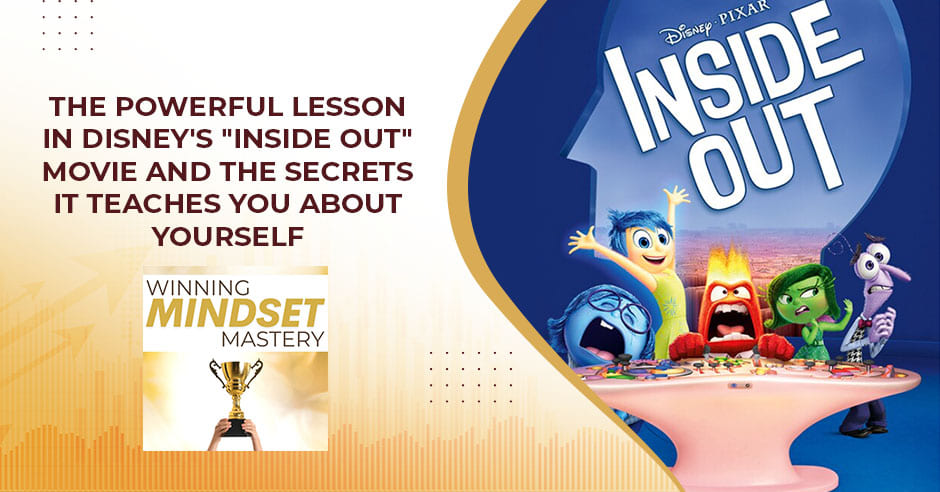
Here’s a big benefit of cultivating a winning mindset: it helps you regulates your moods. It keeps you from being controlled by your emotions. But be careful and be aware of this. We don’t want to bury our emotions. Pain tells us something important about our physical bodies; likewise, our emotions, including unpleasant emotions, tell us something important we should not try to suppress. In today’s episode of the Winning Mindset Mastery Podcast, April talks about four common emotions none of us want to feel. She also gives her quite simple advice on how to handle them.
—
Listen to the podcast here
The Powerful Lesson In Disney’s “Inside Out” Movie And The Secrets It Teaches You About Yourself.
One of the biggest benefits of creating a mindset that works for you, or what I call a winning mindset, is how it regulates your moods in the sense that your emotions aren’t controlling you the way that they may have in the past, where you have maybe high highs and low lows. Things can make you angry and frustrated because you’re taking that pause and looking at things in a way that works for you. Some people might take this as you should always regulate your emotions. Don’t pay attention to them. Be even-keeled. I don’t agree with that.
While I want your emotions to be something that you feel in control of and you feel like you can impact based on the way that you frame and see things, I also want you to pay attention to your emotions because they can tell you some insightful things about what you, as a person, might need. It’s not dissimilar from pain. I’m not a huge person on painkillers unless I know exactly what caused the pain, and I’m not going to do it again. I think pain tells us something very important about our body needing something, whether it’s rest, water, seeing a doctor or whatever it is. The pain is a great indicator. Our emotions are the same way. Let me give you some examples.
Pay attention to your emotions because they can tell you some insightful things about what you, as a person, might need. Share on XOne thing I’ve noticed is that we weren’t always taught to recognize even what our emotions were, or if we were taught to have that self-awareness and understand the emotions we were feeling, we weren’t necessarily told what that means or what that points to for us. We either were told to get over it or to not dwell on it, but sometimes, it can be super helpful to recognize what the feeling is, what that may be telling us, and then address it in a way that will make us feel better. One of those that came up quite a bit during the pandemic for a lot of folks and probably comes up all the time for many people, although we tend to ignore it, is loneliness. Whether you’re with people or you’re not with people, you can experience loneliness.

Inside Out: Whether you’re with people or not, you can experience loneliness.
I would argue that it’s far lonelier to experience it when you’re with people than it is when you’re by yourself. What’s interesting is if you experience loneliness, you’re looking for connection, whether that is one great conversation with someone or being around several people that matter to you. What you’re looking for is to make that connection with someone. The next time you feel lonely, you don’t necessarily have to go find something to do or amuse yourself. You might want to think about, “How long has it been since I feel like I connected with someone, whether in person or over the phone, having a conversation?” Is that something that you can take care of right now?
One that I hear from people a lot, and probably because it’s a powerful emotion and can be much more powerful than being sad or depressed, is anger. A lot of people experience anger on a daily basis or maybe lower-grade frustration and they don’t know where that’s coming from. I’ll tell you that if you’re experiencing anger, you should check your boundaries. If you’re saying, “What are boundaries?” then you’re probably angry a lot.

Inside Out: If you’re experiencing anger, you should check your boundaries.
Boundaries, whether they’re for yourself or other people, are the things you put in place to protect yourself, your time, and your energy so that you aren’t overwrought, overworked, and giving too much of yourself. If you find yourself angry quite a bit, you could benefit from increasing the boundaries that you have with other people.
Another emotion that has gotten a lot of publicity, especially from Brené Brown and all of her studies and discussions of it, is the emotion of shame. It’s interesting because we, as people, will go out of our way not to feel shame and do anything and everything we can to avoid it. The interesting thing is I don’t think you can live life without encountering shame in some way, shape, or form. What it can often indicate, although it can indicate a lot of different things, is that you need to have some self-compassion for yourself. One of the ways that I check in with this if I’m feeling shame is how I would feel if this was something that a friend of mine was experiencing.
I think that that’s useful in so many mindset reframes. Mindset reframe is how you would handle this if this was a little more removed from you. You could be a little more objective. This is a great one to do with shame because I feel like we can be exceptionally hard on ourselves when we’re in shame, whereas we tend to be more compassionate and forgiving with someone else.

Inside Out: We can be exceptionally hard on ourselves when we’re in shame, whereas we tend to be more compassionate and forgiving with someone else.
The last emotion example I want to use because I think so many people deal with this on a day-to-day basis is the emotion of anxiety. That points to a lot of different things, but I always think when I’m feeling anxious that I need to breathe. I actually did a whole episode earlier on in the show about the power of your breath and how I used to think that that was absolute nonsense.
I especially like box breathing because you breathe in for a count of 4, then hold it for a count of 4, breathe out for a count of 4, and then wait for a count of 4 before you start again. If you do 10 of those, pretty much no matter what is going on in your life, you will be in a totally different place after you do those 10. If you’re skeptical, I get it. I was so skeptical myself. The first time I tried this, I felt a huge relief and also like I was an idiot because I had been told it for so long and had never practiced it.
I loved the idea of paying attention to our emotions and some of the things that they could be telling us, especially for you, learning what emotion means and what is normally happening when you experience that emotion. While having a great mindset is going to keep you much more even-keeled, you’ll still have that opportunity to understand what the things around you are causing you to feel, what that means, and how you get yourself back to that better place. Thanks for tuning in. I hope this is super beneficial to you. Here’s to your success.





